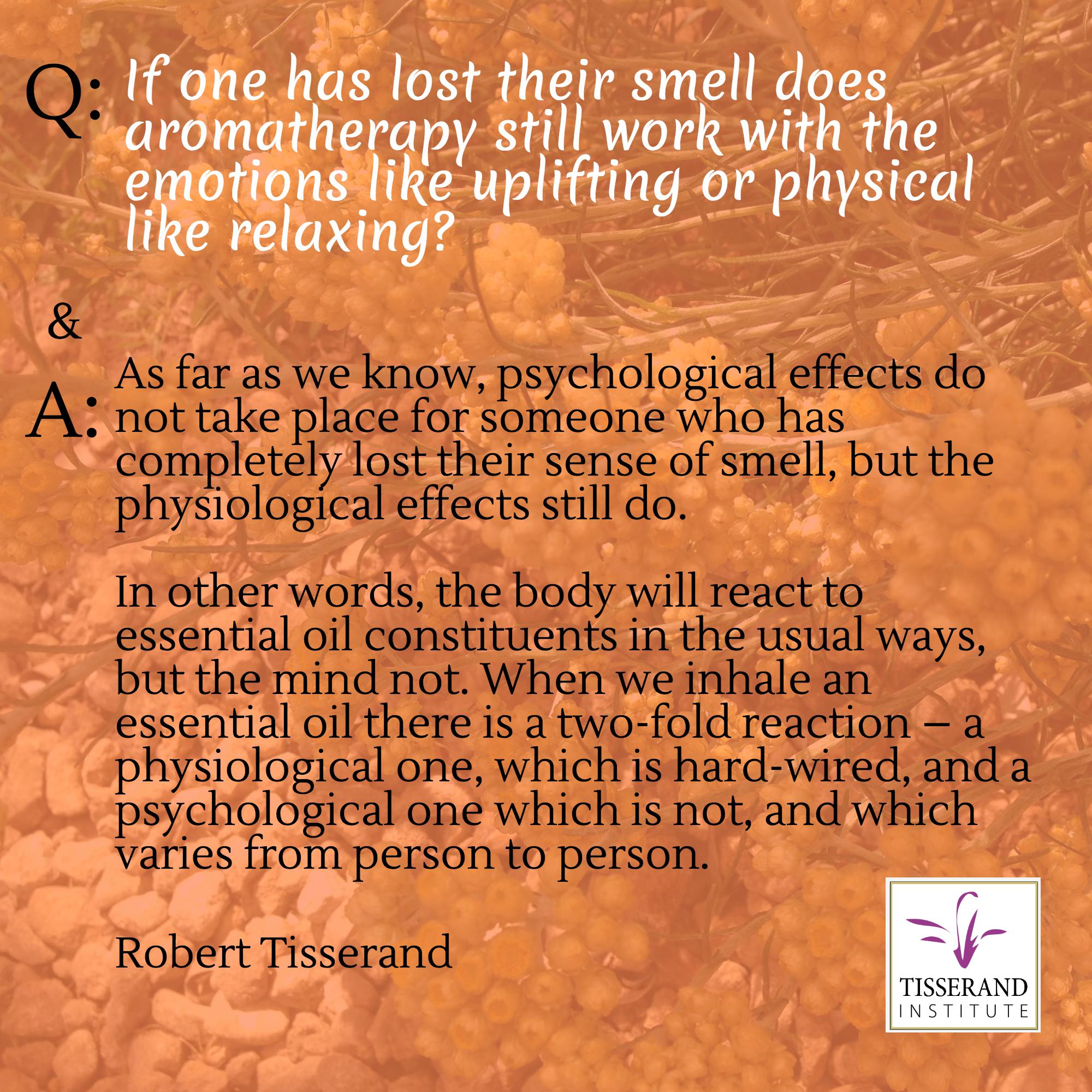This question comes up quite frequently, so we are happy to discuss it here.
Q (by Renee Highlen Gabet): If one has lost their smell does aromatherapy still work with the emotions like uplifting or physical like relaxing?
A: As far as we know, psychological effects do not take place for someone who has completely lost their sense of smell, but the physiological effects still do.
In other words, the body will react to essential oil constituents in the usual ways, but the mind not. When we inhale an essential oil there is a two-fold reaction – a physiological one, which is hard-wired, and a psychological one which is not, and which varies from person to person.
For those of us with an intact sense of smell it may be interesting to note that an essential oil (or blend) cannot have one effect on the mind and the opposite effect on the body. Also bear in mind that psychological effects partly depend on our state of mind and may be different at different times.


I am curious about the ineffectiveness of essential oils on a person with total loss of smell. I wonder if the source of the damage ( ie blunt head trauma, chemical/environmental exposure) could result in damage to different locations along the olfactory pathway, and thereby effect the perception (or lack of) of aroma, leaving intact the limbic system’s response to the aromatic stimulation? Along those same lines of thought, if some aromatic constituents are absorbed by the blood via dermal of respiratory applications, may some of those constituents still pass through the blood-brain barrier and have an impact on the psychological response?
Hello Dia!
And thank you for your questions. Anosmia is a complicated issue and as you said, it very much depends on why the person lost their sense of smell in the first place. You are asking about the psychological/neurological effects of essential oils. The answer to this is not simple, as olfactory stimuli are processed by the olfactory and the trigeminal nerve, and the latter usually stays intact in anosmic people. On top of that, unless the olfactory nerve is disrupted (by a head trauma, for example) signalling is taking place, but not to the full extent. Interestingly, essential oils can be used to re-train your olfactory senses, and I am currently working on an article about this.
Pharmacologically speaking, the effects should be similar. The difference will be in the amount of essential oils is going to get into the brain, as olfaction is a direct route, while going through the bloodstream means that the essential oil constituents will be metabolized before reaching the brain.
However, the psychological effect depends very much on the actual perception of the smell (and what we associate with it). So, to answer your question – pharmacologically speaking, there should be say a calming effect, but we can assume that it will be much less pronounced for people with anosmia.
I hope this helps!
~ Hana Bělíková
Wow. I just made a comment on another site saying I didn’t think it worked as well on my emotions since I have anosmia. This is what I’ve learned using oils. I guess I was spot on. ?
Will diffusing essential oils be beneficial physiologically if you can barely smell the oils or can’t smell the aroma from across the room?
It’s not easy to say definitely “yes” or “no”, but for physiological benefit, using a personal inhaler (stick that you put up to your nose) and inhaling once or twice every 10 minutes is more likely to be beneficial.
I developed anosmia following an operation to remove a non-malignant tumour. I can smell some oils a few
Can I use aromatherapy to improve my sense of smell?
Hi Carol,
You can definitely try – here’s a post we have on smell training: https://tisserandinstitute.org/olfactory-training-and-recovery-of-smell-loss/
The success will depend on what is the reason for your smell loss, and whether it’s due to the olfactory bulb itself being damaged, or other reason. However, the fact that you can still smell some oils is good news.
Can essential oils help to restore my sense of smell after having covid?
Hi Kate,
Yes, there is quite a bit known about smell training to help regain your sense of smell, and from what I have seen it helped people recover their sense of smell quicker.
You can find more on this page: https://www.fifthsense.org.uk/smell-training/ – it’s a UK based charity that promotes smell training.
So I’ve never had a sense of smell as long as I can remember, my doctor has a few theories. I’d like so badly to where something that smells like the ocean, but would my brain detect the chemicals, even if my senses don’t?
Hi Jen!
This would depend on why you lost your sense of smell – and whether you register at least some chemical inputs, such as very pungent substances (think ammoniac, or strong ginger). In that case you may be able to get some sensation.
Your brain will interact with the fragrant constituents just like it does with any other chemical substance, such as drugs. The issue is that it won’t translate the olfactory experience (“this smells like…”)
I think you’ll find the work of Frauke Galia of FalkAromatherapy.com very useful as she likes to find other ways to describe smells and has a lot of resources for people with anosmia. https://www.falkaromatherapy.com/